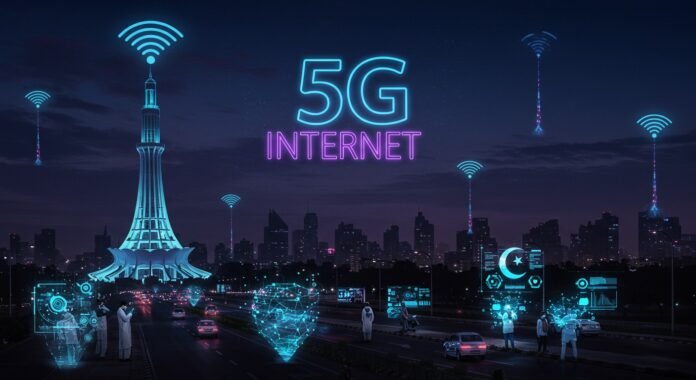Pakistan 5G future is disrupted by legal disputes, spectrum challenges, and regulatory hurdles, delaying rollout and widening the digital divide.
The Unresolved Spectrum Disputes
Radio spectrum litigation is the most critical challenge Pakistan will face in rolling out 5G. The spectrum is the invisible highway that all wireless communication rides on and without clear and conflict free access to the highway, it is but impossible that a 5G auction can be realized. One hundred four out of a thousand 2600 MHz band is captured in an unimaginable decades-long legal dispute, a case that began in 1995. This is the same spectrum which is universally known to be fundamental in 4G and 5G services deployment.
This legal muddle has developed an atmosphere of uncertainty which scares off potential investors and large telecom players. Operators, such as Jazz, Zong and Telenor have stated that they will only engage in a spectrum auction which is clean and not encroached by any legal claim. The efforts by the government in addressing these problems have been fruitless as the country stagnates with the government losing billions in revenue and not being able to realize the economic advantages of 5G technology.
The Merger Between PTCL-Telenor and Its Effects
The other huge legal and regulatory bottleneck is the merger between Telenor Pakistan and Pakistan Telecommunication Company Ltd (PTCL). Competition Commission of Pakistan (CCP) has been considering the merger, which has been stuttered by alleged inability of PTCL to submit the required documentation in the required format.
This is directly affecting the 5G auction strategy as the count of active players within the market following the merger will dictate the type of the auction and the conditions under which the spectrum could be allocated. This is because of the ambiguity that is involved in this consolidation of the major industry and therefore the government and the Pakistan Telecommunication Authority (PTA) are yet to finalize their auction plans until the fate of this merger is determined.
The possibility of leaving the market by Telenor also makes matters even more complicated and it is the question of competition and quality of service provided to millions of subscribers.
The Urban vs. Rural Disparity and Digital Divide
The 5G lateness worsens the already existing digital divide in Pakistan, which places an immense divide between the city and countryside. Although a small proportion of the population in big cities may experience good 4G connections, a very large proportion of rural Pakistani citizens continue to be connected by 2G and 3G networks of lower quality, capacity, and speed, which has led to rural entrepreneurship, 5G can close this gap by allowing high-speed internet access in underserved regions, encourage telemedicine, and enable e-learning.
The fact that these opportunities are being missed is because of the continued delays. A national fiber optic network must be invested by the government and telecom operators to act as a high capacity backhaul of 5G but this is one of the biggest challenges.
The Economic Opportunity Cost
The 5G rollout has been interrupted at a high cost to Pakistan in the form of economic opportunity. In addition to the lost revenue of the spectrum auction itself the country is losing out on the transformative economic benefits that 5G can achieve.
One of the enablers of smart cities, e-health, smart agriculture, and the Internet of Things (IoT) is the technology. An example would be in the agricultural sector, 5G will be used to allow farmers to check the soil pH levels, automate irrigation, and enhance crop yields, which will boost the most vital sector of the US economy.
The lag also impacts the booming freelance and IT export market of Pakistan which is largely dependent on the fast and dependable internet. Pakistani freelancers who inject billions of dollars in the economy do not have an equal chance in competing with clients and other partners in countries that have high connectivity.
Wider Economic and Regulatory Issues
In addition to the particular legal challenges, the 5G path of Pakistan is also clustered with various economic and administrative challenges. The economic condition of the country, which involves high inflation, poor average revenue per user (ARPU), and severe taxation makes telecom operators find it hard to argue the huge investment needed to support 5G infrastructure. Analysts have predicted a minimum cost of a baseline 5G deployment to be up to 8 billion dollars.
In addition, administrative obstacles are very high, such as the absence of upgraded fiber optic cable (OFC) network, difficulties in obtaining the right of way to new cell towers. The move by the government to auction spectrum in foreign exchange as opposed to local currency has also been highlighted as a possible discouraging factor to some operators, diminishing competition and it may influence the bid price. Another challenge is that the percentage of 5G-capable handset among the population remains low and therefore there would be fewer customers to cover the expenses of investment in the early phases of the rollout.
Human and Economic Cost of Delays
The interference with the 5G deployment incurs a high human and economic price. Whereas other nations are capitalizing on 5G to boost every aspect of life such as smart cities, e-commerce, telemedicine and agriculture, Pakistan is largely a 4G economy.
The unavailability of high speed internet (reliable and fast) in the urban set-ups and the rural set-ups increases the digital divide to discourage economic growth. The wasted opportunity is enormous: in a 2022 GSMA report, it was estimated that 5G would add over 1.5 billion to the GDP of Pakistan by 2030. Such delays imply that Pakistan is losing a chance to modernize the economy, generate employment, and advance the services to the population.
The Path Forward
The government has realized how serious the situation is and has declared that it will address these problems. The government, according to recent reports, is considering a spectrum auction that is free of any dispute, and had even sought the services of the Attorney General to attempt to have the pending court cases resolved as hastily as possible.
The government is also contemplating policy change of revenue drive auction to a rapid nationwide rollout policy, potentially with the provision of spectrum at a reduced price in order to stimulate infrastructure investment.



